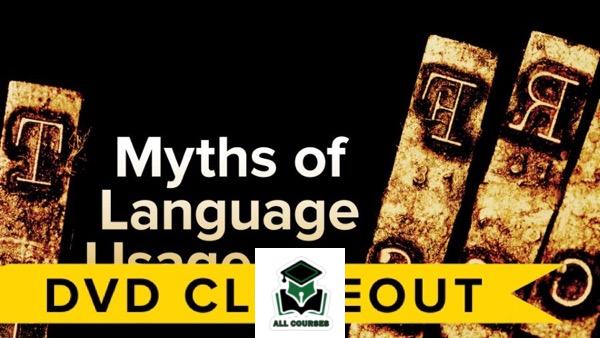John McWhorter – Myths, Lies, and Half-Truths of Language Usage
John McWhorter – Myths, Lies, and Half-Truths of Language Usage course is now available at an affordable price. You can check out directly using multiple payment gateway options. If you have any questions or need an alternative payment method, feel free to contact us.
🎉 Black Friday Deal 🎉
Use code BlackFriday-BL2024 to save 42% OFF on all courses!
Shop All Courses
In this exciting course, Professor McWhorter gives you every reason to be a proud, informed, and more self-aware speaker of English.
File Size: 10.2 GB.
John McWhorter – Myths, Lies, and Half-Truths of Language Usage
John McWhorter, Ph.D.
Far from being a language in decline, we have reason to believe that English, with all its beauty and quirks and illogicities, will be carried far into the future.
Institution: Columbia University
Alma mater: Stanford University
Course Overview
Is English broken? Do bad grammar, slang, and illogical constructions signal a decline in standards of usage? Do e-mail and text messages corrupt the art of writing? In short, is our language going to the dogs?
It’s easy to think so, just as it’s easy to listen to people speaking a foreign language and think that they’re doing something more complicated and interesting than we’re doing in speaking English. But English is complicated and interesting too. Consider the real truth behind these widespread beliefs:
English is in crisis: False. English has been undergoing fundamental change for centuries. Novelty and caprice have created not just slang but the very foundations of what we think of as the best parts of English.
Latin is more perfect than modern languages: False. By historical accident, Latin became the standard for grammatical rigor. But countless languages, including English, are Latin’s equal in precision and expressive power.
Grammar should be logical: False. A double negative is unacceptable in standard English because it implies a positive. But many languages use it without misunderstanding, along with other constructions that defy strict logic.
Texting degrades writing: False. Text messages and e-mail are not crowding out other forms of language. Instead, they fill an important niche—informal writing—that until now had no adequate outlet.
The modern attitude toward English is filled with such misconceptions that obscure the true picture of what a marvelous language it is. Far from being a language in decline, English is the product of surprisingly varied linguistic forces, some of which have only recently come to light. And these forces continue to push English in new directions—in defiance of those who long for an age of formal perfection that never existed.
Taught by acclaimed linguist, author, and Professor John McWhorter of Columbia University, Myths, Lies, and Half-Truths of Language Usage dispels the cloud of confusion that clings to English, giving you a crystal-clear view of why we use it the way we do and where it fits into the diverse languages of the world. After completing these 24 lectures, you will think about how you use English in a new way, listen to others with discernment and fascination, and take joy in speaking such a wonderfully idiosyncratic tongue.
Dig beneath the Surface of English
Like an archaeologist sifting through clues to a vanished civilization, Professor McWhorter highlights the many features of English that sound normal to a native speaker but that linguists find puzzling and also revealing:
Meaningless do: The only languages that use do in the way English does (as in “do not walk”) are the Celtic languages such as Welsh, which were spoken by people who lived among the early English and influenced their language in many subtle ways.
Fossilized mistakes: The little green legume often eaten with carrots was formerly called pease in the singular. The word was gradually misinterpreted as plural because of the final s sound, and a new singular form was assumed to exist: pea.
“Heritage” Old English: One of the mysteries of Modern English is that it resembles a heritage version of Old English. A heritage language is one learned imperfectly at home, typically by immigrant children who acquire a different dominant language.
Hear English with New Ears
In the first part of the course, you address historical mysteries about English. Your investigation begins 2,500 years ago with Proto-Germanic, the language that gave birth to the Germanic languages. From there, you trace the shifting path that eventually led to English—a Germanic language like no other—which lacks grammatical gender and practically all case endings and conjugation markers. “Something happened to English,” says Professor McWhorter, and by the end of Lecture 9 you will have pieced together evidence from many different languages that explain our tongue’s unique evolution.
In the second part of Myths, Lies, and Half-Truths of Language Usage, you focus on modern controversies about how English is used, which take on new clarity in light of the historical background covered earlier in the course.
These lectures give you a fresh perspective on the language, allowing you to understand it more fully:
Pronoun problems: “Billy and me went to the store” is considered incorrect, because the subject form, I, should be used instead of me. But then why does “Me and Billy went to the store” sound so much more fluent than “I and Billy went to the store”?
Lie/lay confusion: Lie and lay exemplify an old pattern in English, in which the vowel is altered to make an intransitive verb transitive. But as with another such pair, drink and drench (where drench originally meant “to force to drink”), the traditional lie/lay distinction is irreversibly withering away.
Dangling participles: “Driving through town, the crowds looked ominous” is deemed ungrammatical, because it suggests the crowds were doing the driving. But what about “Judging from her appearance, she was quite tired,” which has the same construction but is widely accepted?
Terminal prepositions: The rule against ending a sentence with a preposition is largely the work of 18th-century clergyman Robert Lowth, who had so internalized the rhythms of Latin that he wished to impose a similar structure on English, which has a much more flexible relationship with prepositions.
A History of Defying Rules
These examples and many more in the course represent a few of the flash points in English’s long history of defying rules, a process that occurs in all languages. In a vivid analogy, Professor McWhorter says that the effort to keep English the way it used to be is like trying to dry off the beach with a towel. One of the jobs of linguists is to pull back the camera and take in the big picture to see how languages naturally evolve, and to predict where they’re going next.
As you discover in Myths, Lies, and Half-Truths of Language Usage, the evidence is all around you: in the speech you hear in public places and on television, in the always-innovative slang of the young, on the printed page and Internet, and in your own mouth. “Part of being a healthy society is being proud of one’s language,” says Professor McWhorter. In this exciting course, he gives you every reason to be a proud, informed, and more self-aware speaker of English.
24 Lectures
1Alarm over the Decay of English
2Surprises in the Ancestry of Old English
3Not Exactly Anglo-Saxon
4Don’t Forget the Celtic Connection
5From Insider Language to Lingua Franca
6English as Easy German
7The Viking Conquest of English
8How the Words of Modern English Emerged
9Black English—The Streamlining Continues
10Honored Conceits of Blackboard Grammar
11Pronoun Fashions Come and Go
12Wrong Then, Proper Now—and Vice Versa
13A Procession of Accidents and Fossils
14The Pursuit of Logic in Language
15Clarity as the Logic of Language
1620th-Century Fashions from Strunk & White
17The Kinds of Grammar You Don’t Hear About
18Linguists Uncovering Grammar We All Use
19Speech versus Writing—Different Languages
20Speechmaking—From Oratory to Plain Speaking
21The Old and New Styles of Writing
22Got Poetry? Language with Spice
23Why Texting Is Misunderstood
24The Living Past and Future of English
Delivery Policy
When will I receive my course?
You will receive a link to download/view your course immediately or within 1 to 24 hrs. It may takes few minutes, also few hours but never more than 24 hrs. Due to different time zone reasons.
How is my course delivered?
We deliver courses through Google Drive or Telegram. Once your order is complete, you?ll receive an email with a Google Drive or Telegram channel access link to view/download the course.
In case you submit a wrong email address, please contact us to resend the course to the correct email.
Where can I find my course?
Upon completing your order, a link to download or access the course will be sent to your email. Alternatively, you can find it in the ‘My Account’ download section.
If you do not see it there, please share a screenshot of your order and payment with me on Telegram at @ bossallcourses_bot to ensure prompt assistance. I am highly responsive on Telegram.








Reviews
There are no reviews yet.